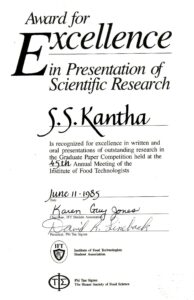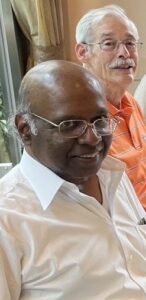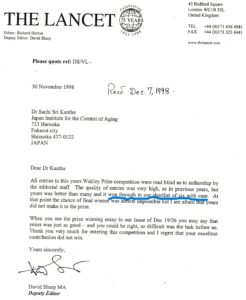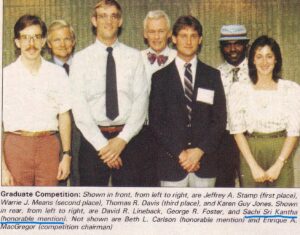Silent Awards of Recognition
by Sachi Sri Kantha, February 15, 2024
I consider that my intellect (not the physical frame) was conceived in Sri Lanka, born in USA and bloomed in Japan. As such, my contributions to research, writing and teaching are filled with tri-partite influences. In this part, I provide snippets of my thoughts on silent awards I was blessed with for my performance until now. I define the phrase ‘silent awards’ as those awards, only the awarder (one who issues the award) and the awardee (recipient) knows about.
RESEARCH
 Award Number 1
Award Number 1
The only award I received for my research was when I was a graduate student at the University of Illinois, Urbana Champaign. I was a member of the lab of Prof. John Erdman Jr. (b. 1945). I entered the Graduate Student Research Paper competition in 1985, and was placed either 4th or 5th (a Honorable Mention status). It was sponsored by the Institute of Food Technologists and Phi Tau Sigma society, and held at the 45th Annual Meeting at Atlanta, Georgia (USA) in June of that year. I was 32 plus then. Though, at that time, I didn’t receive any monetary compensation for such a placing, I liked the verbal display in the certificate I received – ‘Award for Excellence in Presentation in Scientific Research’. It was a good omen and inspiration for me. I was in the Final year of my PhD studies. I successfully defended by PhD dissertation on December 4, 1985.
As many can notice, Award No. 1 is somewhat a stretch to my definition of a ‘silent award’, mentioned at the beginning because, I had received the recognition publicly with a photo opportunity with the 1st, 2nd and 3rd place recipients of the Award, and this photo did appear in the Food Technology journal of Aug 1985. Nevertheless, I include it here, as a reasonable exception because this award instilled confidence to my research skill that I could compete equally with American graduate students from other American universities and reach a rank within ‘top five’, on that particular day, with a particular panel of scientist judges.
Award No. 2
I reproduce the final paragraph of my autobiography (2004, vol.1) below.

Sachi and Prof John Erdman (orange T-shirt) in Tokyo, July 2023
“Just before I left the University of Illinois, Prof. Erdman offered me a sound advice: ‘Sri, now you are on your own. You should be able to write a paper and guide it through the final step of seeing it in print, without any help from me.’ I took this advice to heart. By then, at the age of 32 plus, I had a total of 10 journal papers and one Proceeding publication. All were co-authored with my mentors Navam Hettiarachchy and John Erdman. These publications, based on my graduate level research carried out at the universities in Peradeniya and Illinois, satisfied my ego as a published scientist. By the standards of elitism, these papers were hardly impressive. I was determined to publish books and papers as a sole author.”
Prof. Erdman’s award was a verbal advice. It instilled confidence in my research and writing skill. Now, after 39 years of this verbal award from my mentor, my publication record as a scientist-author in peer-reviewed science journals stands at 174 published ‘items’. Among these 174 ‘items’ (original research papers, thought papers, reviews, commentaries, editorials and letters to the editor), 112 items were sole authored – 64 percent.
Isaac Asimov (1920-1992), one of my guides to writing on diverse topics, wrote in his 1994 memoir, “No one in history has written more books on more different subjects than I have. Please understand that I am so modest, it is embarrassing for me to say such a thing, but – I cannot tell a lie.” To paraphrase and modify Asimov’s boast, I can assert now – ‘None of my contemporary scientists in Japan has written more lucid papers on more different themes than I have in English. Please understand that I am so modest, it is embarrassing for me to say such a thing, but – I cannot tell a lie.’ About what I had published in these 174 ‘items’ (ranging from Aotus – that is owl monkey – to James Watson, and other elites who captured my taste like Chaplin, Freud, Kama Sutra, Marilyn Monroe, Nobel and Shakespeare) I need to write a separate commentary; this I’ll to do so later. I feel proud to record here that in the past decade (2014-2023) alone, I published 46 among the 176 papers in the International Medical Journal (Tokyo)!
Due to my deflated status as an émigré scientist in group-centered Japanese culture, I was mostly a loner without any research lab or certified group. This was my preference too. From 2002 to 2018, my only collaborator was veterinarian scientist Dr. Juri Suzuki, affiliated to Kyoto University’s Primate Research Institute. Currently, I collaborate with Dr. Sanjay A Pai of India for medical history research.
WRITING
Award No. 3
One silent award I received for my writing was being placed among the ‘top six’ in the Lancet journal’s Wakley Essay competition of 1998. This ‘award’ was only a letter from Mr. David Sharp, the deputy Editor of Lancet journal, dated Nov 30. 1998. The competition rules were – (i) 2,000 word (maximum limit), (ii) a topic of clinical relevance of international importance. (iii) monetary award of 2,000 pound sterlings for the first prize only. The theme I chose was suicide – a pertinent theme to Eelam Tamils. I titled my essay as ‘Suicide – a Socratic Revenge’. Obviously my objective was on the first prize, but I fell short. I was 45 plus then. In hindsight, I realized what might have gone wrong. There were probably two reasons. First, the chosen theme of suicide, though of clinical relevance, was somewhat a ‘downer’ for year-end issue in which readers may find it rather uncomfortable to reflect. Secondly, I was not a medically qualified individual, which might have influenced the selection team for that year. After all, who said that medical community is immune to snobbery.
 Subsequently, I marginally revised the essay text for publication, by adding an abstract as well as references, and submitted it to the Ceylon Medical Journal for publication. And Prof. Colvin Goonaratna graciously accepted it for publication. It was published in the first issue of year 2000 with a foot note ‘This essay entered the shortlist of 6 for the Lancet’s 1998 Wakley Prize Competition, but did not win.’
Subsequently, I marginally revised the essay text for publication, by adding an abstract as well as references, and submitted it to the Ceylon Medical Journal for publication. And Prof. Colvin Goonaratna graciously accepted it for publication. It was published in the first issue of year 2000 with a foot note ‘This essay entered the shortlist of 6 for the Lancet’s 1998 Wakley Prize Competition, but did not win.’
The abstract of this essay was as follows: ‘2,400 years have passed since the occurrence in Athens, Greece of one of the famous suicides recorded in human history. This autobiographical essay provides a montage on the history of suicide, with snippets from the final hours of Socrates, as described by Plato. Suicide in contemporary Japanese culture is also explored briefly, with reference to the deaths of internationally acclaimed movie directors Akira Kurosawa and Juzo Itami. The author also questions why no researcher has yet been honoured for the past 99 years with a Medicine Nobel prize for his or her work on suicidology or thanatology.’
Though 25 years had passed since I wrote this ‘suicide’ essay, still not a single Nobel prize has been awarded for research on suicide. This is because, it is NOT easy to research on suicide. First, unlike other diseases, there are NO reliable animal models. Secondly, due to ethical concerns, one cannot recruit volunteers among humans for suicide research. Thirdly, even if such volunteers are available, at the end of the experimental period, they will not be living to describe their experiences to the researchers. Thus, research on suicides is limited to either studying the body tissues (mainly brain) of those who had committed suicide successfully or those who had failed in their suicide to elucidate their motives on suicidal ideation.
TEACHING
Award No. 4
In 2012, I received a unique silent award in the form of a 900 word essay from a woman student for an exam question. The question I had asked the entire class of 65 odd students was ‘Write an essay on your serendipity experience.’ She was affiliated to the Applied Science Faculty of Gifu University. This is what I received from Ayano Murase.
My Serendipity Experience
“My serendipity experience was to meet Dr. Sri Kantha. He is my scientific English teacher. I enrolled for the scientific English course, because it was a compulsory course. When I was sitting in the classroom, he entered. In brief, our meeting was just an accident. This accidental meeting enabled me to change my thinking about scientific English.
We first met last April (2011). At first, I was only puzzled because I couldn’t understand what he talked and his intention. The theme of an English speech was something that we are good at: but, I didn’t care about importance of empiricism, criticism and communication. I had never taken such a course where marks were almost assessed by class activity. The classroom was always charged with strange tension and I was not alone in thinking so. When I talked with my seniors, I found that a similar course (instructed by him) for 3rd years was similar as well. I bothered what to do. I was clear about one deed. This is because, his class will last for two years and I thought that the class will be better if we don’t act immediately. So, I visited his room with two of my friends. This face to face conversation with him was interesting. We told him our thought – our English skill was poorer than he had expected that we wanted him to teach easily. The most impressive expression in his talk was ‘Imagination is more important than knowledge’. This was originally an Einstein quote – a poster he had tacked in his wall. I noticed that he wanted to carry out education which promoted our imagination.

1985 IFT award photo in ‘Food Technology’ journal (Aug 1985) Sachi is wearing a blue cap.
After that I could improve my attitude. I listened to English carefully and tried to encourage a scientific view in the class. When Dr. Sri Kantha called upon me, I spoke something in English even if I didn’t know the answer. Sometimes I could not have appropriate sentences and had to express by some words, but it was not a big problem. On the other hand, he also changed his class routine. He came to distribute prints before important times such as a test and gave questionnaires to listen to our opinions (though it was done in an atmosphere in which we felt uneasy to comment on).
Most impressive contents in his class were speeches in English we have to do. They were studies of output while reading and listening were those of input. We had four such speech exercises: ‘My idol scientist’, ‘If I’m a bird, I’d be a…’, ‘What makes me cry?’ and ‘What I’m curious about?’ I was careful about two points in making a speech. One was to express in easy English. The purpose of speech was to tell my thought to audience and it was meaningless if they could not understand. The other was to make it interesting. Audience would be bored if I didn’t make an interesting speech, because they had to hear speeches of many students in the class. I learned scientific thinking and how to express myself by English speech. Of course, not only my skill, but everyone’s speech skills also improved.
There were also contents that we have to criticize few research papers in his class. This is new to me, since I had not criticized a paper whose author is more intelligent than me. First, I thought it was impossible for me and a waste of time. I could not read papers in English satisfactorily and yet, why on Earth I could criticize them? But, my idea was wrong. I had to do it, because I could not. By trying to criticize these papers, I could understand them deeply. What does that figure mean? What is the relationship between two sentences? By reading a paper, and having such questions, I could understand English scientifically. If I study only English-Japanese translation, I could not get this sort of understanding. But I thought, some themes of the papers were not suitable. There are many better themes to choose.
I learned true scientific English from Dr. Sri Kantha. To memorize English words and translate English sentences into Japanese is not a study of scientific English. It is important to encourage the sense of imagination and humor and thing about science regardless of the language. We have to use English as a tool in scientific English class, nothing more. I thought that the English skill that is not enough for Japanese people is not vocabulary but expressiveness. Dr. Sri Kantha has given us the subjects that we must study until now, and we have studied passively. However, we have to learn actively by ourselves from now on.
English is a minimum tool for communication in the world. I will get employment in two years. What will be awaiting me? What will become of Japan? No one can tell the answer, but what I have learned in two years, will never betray me. My meeting with him changed my thinking about both English and science study. I want to remember his teaching when I am exposed to English.
Finally, I am studying scientific English ‘now’. In other words, writing this report is studying English scientifically. Thinking back, remembering a serendipity experience and expressing thoughts in English are all based on what we had learned. I am being taught deeply by you, until the very end. Thank you for all the guidance you have given me.”
I was delighted because among the 65 students in the class, only Ayano thought of treating my teaching as a serendipity experience in her life.
Award No. 5
This award is akin to Award No. 4. I had given a two minutes English speech topic to a class of first year students in Education curriculum. The topic was ‘If I’m a bird…?
A student named Masayuki Arakawa roasted me humorously, as follows:
‘If I was a bird, I want to be a crow. Crow means ‘karasu’ in Japanese. Why I chose a crow? To tell the truth, I love chicken food, for example fried chicken. So, I thought at first, I choose chicken. But, for this speech I choose a crow. Because crow is very intelligent – just like Mr Sri Kantha! And crow is very cool – just like Mr Sri Kantha! Moreover, crow is very dandy – just like Mr Sri Kantha! So, I want to be Mr Sri Kantha! Oh! Sorry – I want to be a crow, if I’m a bird.’
For Award No. 5, at least 20 of Arakawa’s peers in the class were eyewitnesses to my ‘roast’.
*****
It is very impressive to know the amazing milestones of Dr. Sachi’s Career, Reaching 70 is a memorable time to reflect on one’s achievements and Thanks to Dr. Sachi on sharing them with us.
Sachi is a fascinating, multifaceted scientist with varying interests in the arts, history and politics. His oeuvre brings out all this and beyond. I have learnt much from his writings and him. Keep writing Sachi.